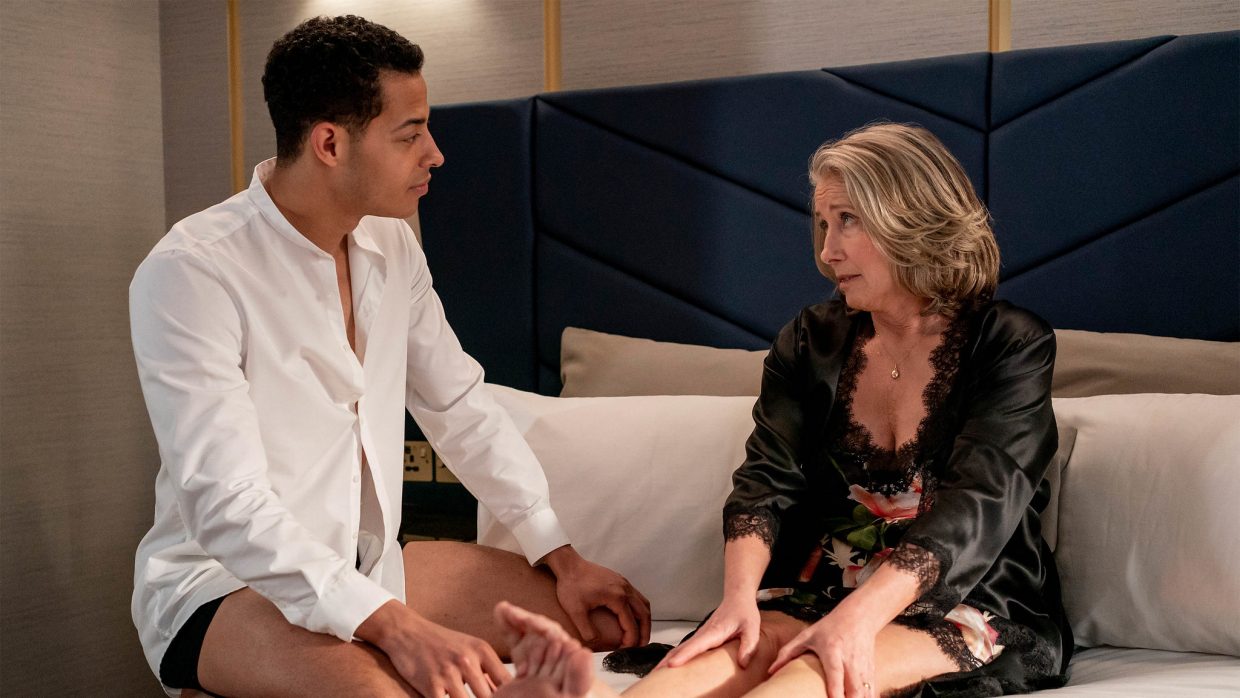 Back to selection
Back to selection
“Skate Videos Really Influenced My Sensibility as a Filmmaker”: Editor Bryan Mason on Good Luck to You, Leo Grande
 Emma Thompson and Daryl McCormack in Good Luck to You, Leo Grande. (Photo: Nick Wall)
Emma Thompson and Daryl McCormack in Good Luck to You, Leo Grande. (Photo: Nick Wall) In Good Luck to You, Leo Grande, Emma Thompson plays a retired schoolteacher who is certain she has never had good sex. She decides to change that by checking into a hotel room and hiring a sex worker, but he quickly appears to take an interest in her that is more than professional. Much of the film consists of these two characters in a hotel room, and editor Bryan Mason discusses the importance of highlighting performances and chemistry to keep the audience’s attention.
Filmmaker: How and why did you wind up being the editor of your film? What were the factors and attributes that led to your being hired for this job?
Mason: The film’s director Sophie Hyde and I have a long history of working together, so I was thrilled when she asked me to work with her again on this film, although from the first read of the script I was curious how we would keep an audience’s attention through a journey which is basically two people in a room for the best part of 95 minutes.
Filmmaker: In terms of advancing your film from its earliest assembly to your final cut, what were your goals as an editor? What elements of the film did you want to enhance, or preserve, or tease out or totally reshape?
Mason: I think my goal as an editor is more or less the same for every project, which is to make the best version of the film you can within the time you have! It sounds too simplistic, but I really do think that’s what it boils down to for me. In particular, with this film it was important to get the right balance between the two characters so you feel for them both at various times as the dynamic swings and shifts as they transition from strangers and a familiarity grows.
Filmmaker: How did you achieve these goals? What types of editing techniques, or processes, or feedback screenings allowed this work to occur?
Mason: Sophie and I worked very closely through all stages of the edit together really trying to make the most of the footage and select the performances which gave us the best character journey. At various stages of the edit we showed the film to trusted collaborators and this was invaluable to get a sense of what was reading and what wasn’t.
Filmmaker: As an editor, how did you come up in the business, and what influences have affected your work?
Mason: I grew up skateboarding and filming skating. While I was still at school I edited a skate video of our little crew of skaters, from VHS to VHS, play record, pause, play record, style. This was my first experience of editing and I really enjoyed it. Then as I finished school and went on to study film, I gravitated towards the camera and the edit suite rather naturally. Early on, skate videos really influenced my sensibility as a filmmaker and editor in particular. Now I am influenced by feature films mostly and I am still amazed when a film manages to sweep me up into the narrative and all the filmmaking techniques disappear and you are just in the story. That is good editing, I think; that is what I am always striving for.
Filmmaker: What editing system did you use, and why?
Mason: I cut on Adobe Premiere Pro and have done for years now. It keeps evolving and updating and is a great system.
Filmmaker: What was the most difficult scene to cut and why? And how did you do it?
Mason: The opening of the film was probably the trickiest sequence to cut, as it shifted and changed a few times from what was envisioned originally. It took a while for the right piece of music to land and what we ended up with is a fun intercut between the two main characters as they both prepare to meet for the first time. This became our title sequence and really took a few revisions to get there. What it needed was time and space to try something, let it settle, revisit, tweak, reimagine, let it settle, try the graphics, the music, a different piece of music, ah now we are getting there, let it sit, try another font or layout, revisit, let it sit, yep still feeling good, ahh. It went a bit like that.
Filmmaker: What role did VFX work, or compositing, or other post-production techniques play in terms of the final edit?
Mason: There are only a handful of VFX shots in the film, they are subtle but really help a couple of moments along tremendously.
Filmmaker: Finally, now that the process is over, what new meanings has the film taken on for you? What did you discover in the footage that you might not have seen initially, and how does your final understanding of the film differ from the understanding that you began with?
Mason: When I read the script for this film initially I imagined a slightly different tone than that of the finished film. I thought it would be lighter and more disposable in some way, but the depth and reality that Sophie managed to find with the cast is surprising and ultimately quite touching.
